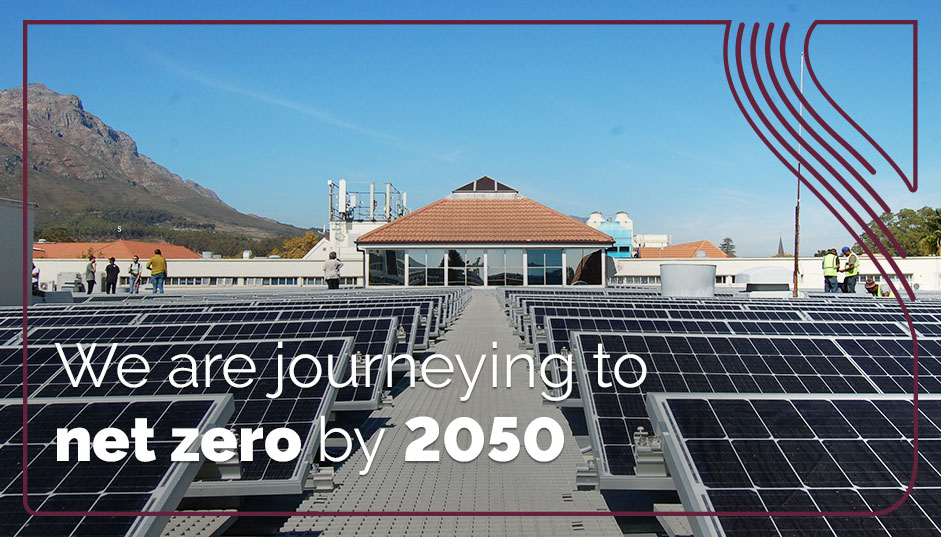
Stellenbosch University has embarked on an ambitious journey to achieve net zero status by 2050 with the launch of its first Environmental Sustainability Plan (ESP).
With the launch of its first Environmental Sustainability Plan (ESP), Stellenbosch University (SU) has embarked on an ambitious journey to achieve net zero status – that much-desired balance between the amount of greenhouse gas produced and the amount removed from the atmosphere – by 2050.
According to SU Rector and Vice-Chancellor Prof Wim de Villiers, the ESP represents the University’s aim to meet the sustainability challenge presented by the climate crisis. The plan reduces the environmental impact of SU’s campuses and demonstrates a commitment to sustainability in terms of the environment, resources and society.
“As one of Africa’s leading research-intensive universities, SU should play a significant role in forging the path to a sustainable future. Sustainability is a core component of our strategy, and we aim to create a community of sustainable changemakers. Our responsibility is to use our resources so that we leave a thriving environment for future generations,” - Prof Wim De Villiers.
Chief Director of Facilities Management, Nicolette van den Eijkel, says the University supports the United Nations’ sustainable development goals (SDGs) as a pathway to responsible development. “Through our extensive global network, SU actively engages in the broader national and international aspects of sustainability. Apart from the SDGs, the University’s Vision 2040 also considers South Africa’s own National Development Plan and the African Union’s Agenda 2063,” she explains. “As such, SU is uniquely positioned to drive the pursuit of sustainable development and environmental sustainability locally and on the African continent through our actions at our own institution.”
Nadeem Gafieldien, director of Property Services, says SU has already commenced with various projects included in the ESP, such as implementing greywater systems on two campuses. “These changes aim to build resilience in our systems to weather future environmental shocks, while reducing consumption, cost and carbon,” he says. “Through our greywater systems, we have achieved a 50% reduction in potable-water consumption on campus. “In the next five years, Facilities Management will continue to roll out various other ESP projects to the value of more than R100 million. These projects will help drive the eight themes of energy and emissions, water, waste, biodiversity and land use, travel and mobility, sustainable buildings, goods and services, and engagement,” Gafieldien adds.
DISCOVER HOWOur eight themes

Energy and emmissions

Water

Waste

Biodiversity and land use

Travel and mobility

Sustainable buildings

Goods and services

Engagement
Principles
The Environmental Sustainability Plan develops SU in a manner that respects ecological thresholds and enhances both society and the natural environment to avoid depletion or degradation of natural resources and ensure diverse, resilient and productive ecosystems for current and future generations.
Ethical use of natural resources:
SU strives to use resources responsibly.
Meaningful engagement:
SU actively engages the University and local communities to foster a regenerative culture that promotes and drives environmental sustainability.
Research:
The University acknowledges its responsibility to support innovative research towards creating a more environmentally sustainable world.
Education:
SU acknowledges that teaching and learning programmes must inspire and support future generations and students to be leaders who nurture an environmentally sustainable future.
Ethical procurement:
SU seeks to procure goods and services using sustainable and certified ethical sources and practices.
Visit our Environmental Sustainability page
here

